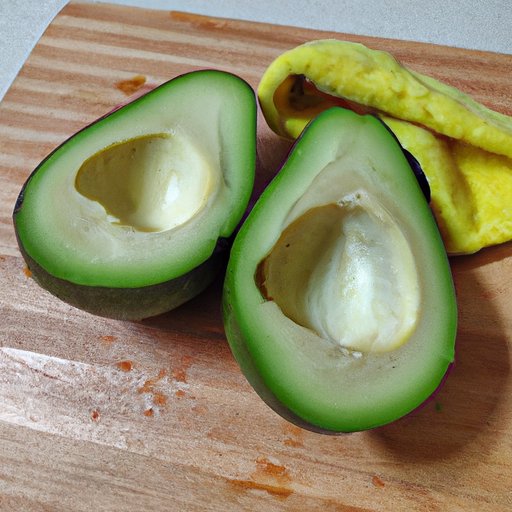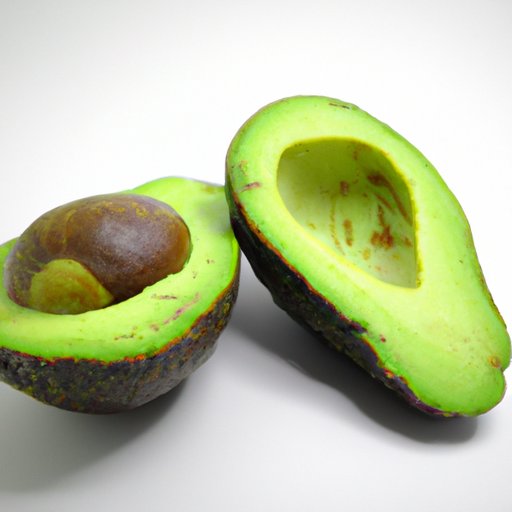Introduction
Avocado is a nutrient-dense fruit that has become increasingly popular in recent years. From its creamy texture to its unique flavor, it’s no wonder why this unique fruit has become a staple in many diets. But what makes avocado so special? Is it really good for you and can it help with weight loss? In this article, we will explore the benefits of eating avocado for weight loss and discuss how to incorporate it into your diet for maximum health benefits.
Exploring the Benefits of Eating Avocado for Weight Loss
Avocado is packed with essential vitamins, minerals and healthy fats that make it an ideal food for those looking to lose weight. Here are some of the key benefits of adding avocado to your diet:
Filling & Nutrition
Avocado is high in fiber, which helps keep you feeling full for longer. This can be beneficial for those looking to lose weight as it prevents overeating and snacking between meals. It also provides a range of essential vitamins and minerals, including potassium, vitamin E, folate, and magnesium.
Healthy Fats
Avocado is high in monounsaturated fatty acids, which have been linked to reduced risk of heart disease. These healthy fats can also help control cravings and hunger, making it easier to stick to a healthy diet.
Fibre Content
Avocado is a great source of dietary fibre, which is important for maintaining a healthy weight. Fibre helps slow digestion and keeps you feeling full longer. It also helps regulate blood sugar levels and can reduce cholesterol levels.
Antioxidants
Avocado is also rich in antioxidants, which can help protect against oxidative damage and reduce inflammation. Antioxidants may also help improve metabolic health, which can be beneficial for weight loss.
A Dietitian’s Guide to Adding Avocado to Your Diet
Adding avocado to your diet can be a great way to improve your health and aid in weight loss. Here are some tips on how to incorporate avocado into your diet:
Serving Suggestions
Avocado can be added to salads, sandwiches, wraps, smoothies, and more. It can also be used as a healthy substitute for butter or mayonnaise. For breakfast, try adding mashed avocado to toast or mixing it into scrambled eggs.
Recipes to Try
If you’re looking for ways to add more avocado to your diet, there are plenty of delicious recipes to try. Try making guacamole, avocado toast, or even a vegan avocado ice cream. There are endless possibilities when it comes to cooking with avocado.

How to Incorporate Avocado Into Your Diet for Maximum Health Benefits
Incorporating avocado into your diet is easy, but it’s important to remember that moderation is key. Here are some tips to keep in mind when adding avocado to your diet:
Balance It Out
Avocado is high in fat and calories, so it’s important to balance it out with other healthy foods. Make sure to include protein, carbs, and other sources of healthy fats in your meals to ensure you’re getting all the nutrients your body needs.
Read Labels
When buying pre-packaged avocado products, such as guacamole or avocado dip, make sure to read the labels. Look for products that are low in sodium and free of added sugars.
Variety is Key
Make sure to vary your diet and try different types of avocado-based dishes. This will help ensure you’re getting all the nutrients your body needs and help prevent boredom with your diet.

The Role of Avocado in a Healthy Diet
Avocado is a great source of essential vitamins, minerals, and healthy fats. Here’s a look at some of the key nutrients you’ll get from eating avocado:
Macronutrients
Avocado is a good source of carbohydrates, protein, and healthy fats. It also contains small amounts of iron and calcium.
Vitamins & Minerals
Avocado is a good source of essential vitamins and minerals, including vitamin C, E, K, B6, folate, and potassium. It’s also a good source of dietary fibre.
Is Avocado Good for You? A Look at the Nutritional Facts
Avocado is a nutrient-dense food that can be beneficial for weight loss and overall health. Here’s a closer look at the nutritional facts:
Calories
A single serving of avocado (one-third of a medium-sized avocado) contains 80 calories. This makes it a great snack option if you’re trying to lose weight.
Fat Content
Avocado is high in monounsaturated fats, which are considered “good” fats. A single serving of avocado contains 7g of fat, 2g of which is saturated fat.
Cholesterol Levels
Avocado does not contain any cholesterol. This makes it a great choice for those who are trying to lower their cholesterol levels.
Conclusion
Avocado is a nutrient-dense fruit that can be beneficial for weight loss and overall health. It’s high in fiber, vitamins, minerals, and healthy fats, making it an ideal food for those looking to lose weight. When adding avocado to your diet, make sure to balance it out with other healthy foods and read labels on pre-packaged products. With its unique flavor and creamy texture, avocado can make a great addition to any diet.
(Note: Is this article not meeting your expectations? Do you have knowledge or insights to share? Unlock new opportunities and expand your reach by joining our authors team. Click Registration to join us and share your expertise with our readers.)
